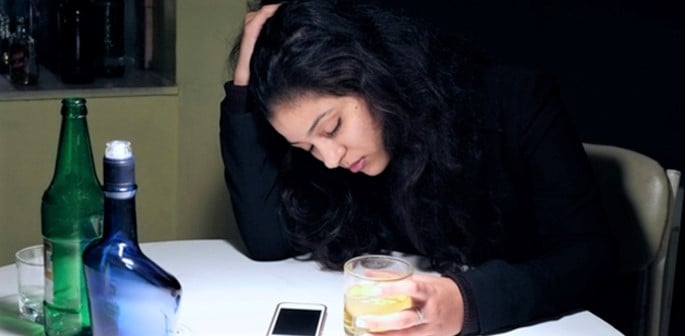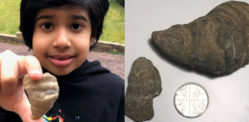"I went from a glass of wine to a bottle"
The story of British Asians struggling with alcohol addiction is unfortunately on the rise. As is the case with 21-year-old Jasmine Thakur*, a student at the University of Birmingham.
The taboo surrounding alcohol addiction in South Asian families often results in individuals struggling to seek help and support.
The cultural stigma of shame and dishonour surrounding addiction, along with the normalisation of alcohol consumption at an early age, can lead to an uphill battle in overcoming addiction.
In this first-person account, we hear from Jasmine who has been grappling with alcohol addiction and the struggles she faced in seeking support from her family.
Drinking Culture
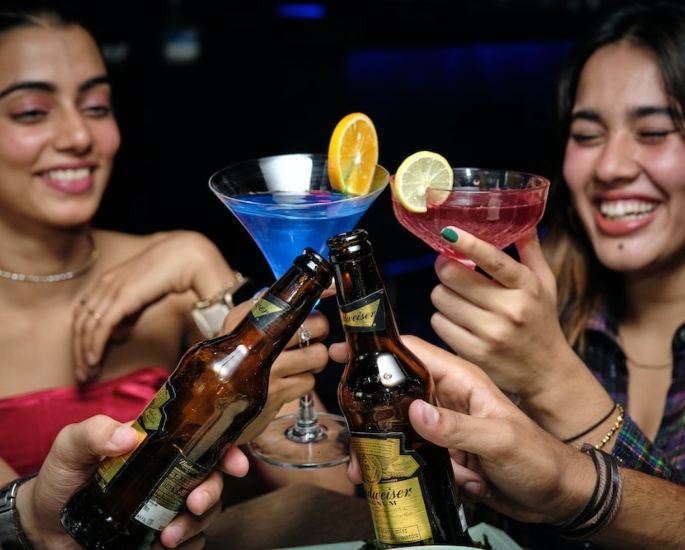
Drinking culture among British Asians varies greatly depending on a number of factors, such as cultural background, age, and social circumstances.
Some British Asians choose not to drink alcohol due to their beliefs.
However, there are many British Asians who do drink alcohol, particularly among the younger generation who may have grown up in a more westernised environment.
In these cases, drinking in excess at parties and social events is normalised. This is what Jasmine highlights as the foundation of her alcohol addiction:
“Growing up in a South Asian family, I was exposed to alcohol culture at a young age.
“At weddings and family gatherings, alcohol was always present and it was almost expected to drink.
“My family normalised it, making it seem like a part of our culture, and I found myself indulging in it at a young age.
“The first time I had alcohol, I was 16 years old. It was at a family wedding, and my parents allowed me to have a glass of wine.
“I remember feeling giddy and happy, and I enjoyed the sensation. It was a new experience, and I found myself wanting to drink more.
“One situation that stands out to me was at a family party.
“My uncle offered me a drink, but I declined, saying that I didn’t really feel like drinking that day.
“He looked at me weirdly and asked me if I was feeling alright.”
“My aunt then chimed in and said that it was weird for a young person like me not to drink, and that I should just have one to be social.
“I reluctantly took the drink, and before I knew it, I had several more.
“As I entered university, my drinking began to worsen.
“It started as just social drinking with my friends before going out, but it quickly turned into a daily habit.
“I’d go and hang out with the boys because they would session every night for fun. I thought it was fun too but found myself needing to drink to be more funny or relaxed.
“But you soon find out, the more you do something, the more you can tolerate it.
“That’s what happened with alcohol. I went from a glass of wine to a bottle to mixing drinks throughout the night.
“These things start off casually. Like I’d be in my room and say to myself ‘oh I’ll have one glass’ whilst I’m doing an assignment.
“Then when that happens every day, it’s something you can’t escape.
“I found myself drinking alone, using alcohol as a coping mechanism to deal with stress and anxiety.
“But, I knew I had a problem and I couldn’t bring myself to admit it.
“I remember another time when I was with my friends, and I started realising my drinking was becoming worse, and I didn’t want to drink that night.
“But my friends were insistent that I should have at least one to celebrate.
“I gave in, and soon enough, I had lost count of how many I had.
“I woke up the next day with a pounding headache and a feeling of shame and guilt.
“My family never really paid attention to it, probably because they too love a drink.
“They always saw it as a part of our culture, and they never saw it as a problem. It was almost as if they turned a blind eye to it.
“I didn’t know how to approach them and tell them that I needed help. I was afraid of the shame and dishonour it would bring to my family if they found out.”
Jasmine importantly highlights how alcohol is a vital part of some British Asian communities, especially her own.
The importance placed on “having one” and the judgement she got from her uncle and auntie displays just how difficult it is for some British Asians to not drink.
Alone & Shamed
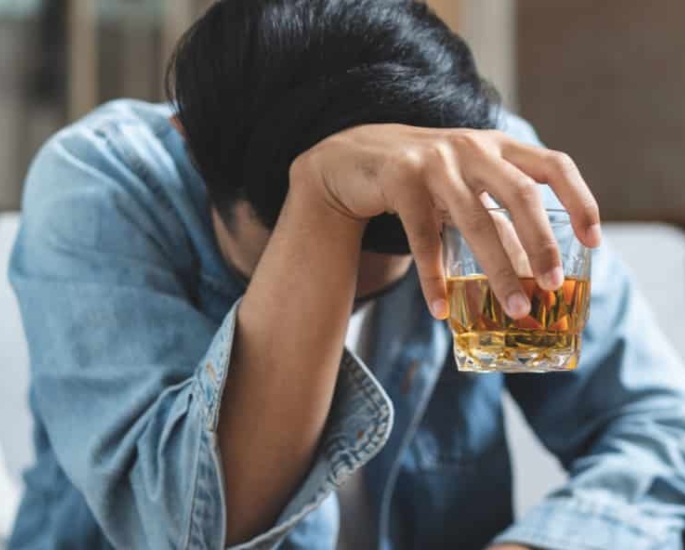
Jasmine tells us about how fearful she was of coming forward about her alcohol addiction.
In British and South Asian families, having a type of addiction is heavily frowned upon and almost shunned away as a “phase”:
“The stigma around speaking about alcohol addiction in Asian culture is overwhelming.
“It’s almost as if it’s taboo to talk about it. People are afraid of being judged or seen as weak.
“It’s something that is brushed under the rug and ignored.
“I felt this stigma heavily, and I didn’t want to be seen as a failure in the eyes of my family and friends.
“As my addiction progressed, I found myself in dangerous situations.
“I would go out alone and drink until I couldn’t remember anything, I was putting myself in harm’s way, and I knew that I needed help.
“I knew it was time to confront my family about my problem.
“It was not easy to admit that I was struggling and I needed help, especially when I knew that talking about addiction in the South Asian community is basically nonexistent.
“However, I knew that I could not continue on this path of self-destruction, I needed the support of my family to help me overcome my problem.
“I went to my parents and siblings one day and explained to them the extent of my drinking and how it was affecting my life.
“I hoped that they would be understanding and supportive, but to my surprise, they were dismissive and refused to take my addiction seriously.
“They told me that I was young and that it was just a phase, and that I should simply stop drinking and move on with my life.
“This response was heartbreaking, and I felt like I had hit a wall.”
“It seemed like my family did not understand the severity of the struggles that I was dealing with.
“It was as though they were unwilling to face the reality of the situation, and this made me feel even more isolated and alone.
“I tried to explain to them that addiction was a real disease and that it required professional help and support to overcome.
“But my family seemed to think that it was a personal failing and that I simply lacked the willpower to stop drinking.
“This belief only made things worse, as I felt like I was being judged for something that was out of my control.
“It was clear that my family had that typical Asian mindset and I felt like I had nowhere to turn.
“It made it harder for me to find support outside of my family, and I felt like I was trapped in a vicious cycle of addiction and shame.”
Jasmine’s emotional words tell the story of so many individuals who have no one to turn to.
That’s why it is important for more discussions to be held within these communities so that other people can seek the help they need.
A Lonely Recovery
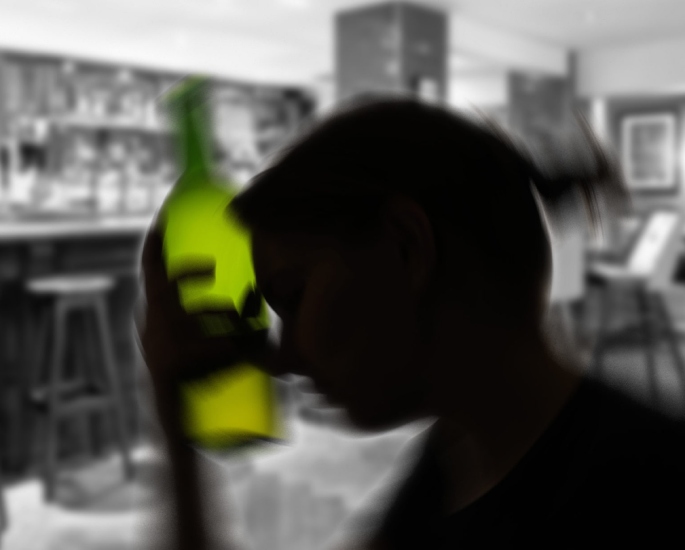
Even though Jasmine faced a major setback with her own family, it didn’t deter her away from seeking support or resources:
“It wasn’t until I hit rock bottom that I finally reached out for help.
“I realised that I couldn’t continue living like this, and I needed to make a change.
“I started attending Alcoholics Anonymous meetings, and I slowly began to see improvements in my life. However, I still struggle with my addiction to this day.
“Alcohol addiction is a serious issue in South Asian communities, but it’s often ignored or overlooked.
“It’s important to recognise that it’s a problem that needs to be addressed.
“It’s time to break the stigma around speaking about alcohol addiction in South Asian culture.
“We need to start having open and honest conversations about it. We need to provide support and resources for those who are struggling.
“It’s not a weakness to admit that you have a problem; it takes strength and courage to seek help.”
The stigma of alcohol addiction in South Asian culture can have devastating effects on individuals struggling with this illness.
The normalisation of alcohol consumption and the cultural pressures to conform to social expectations can make it incredibly difficult for individuals to seek help and support.
By sharing experiences like this one, we hope to shed light on the challenges faced by individuals dealing with addiction in South Asian communities.
Hopefully, this will inspire families to break down the taboo surrounding addiction and provide support and encouragement to their loved ones.
If you or know anyone experiencing alcohol addiction, you are not alone. Reach out for support:
- Drinkline – 0300 123 1110
- Alcoholics Anonymous – 0800 917 7650




















































